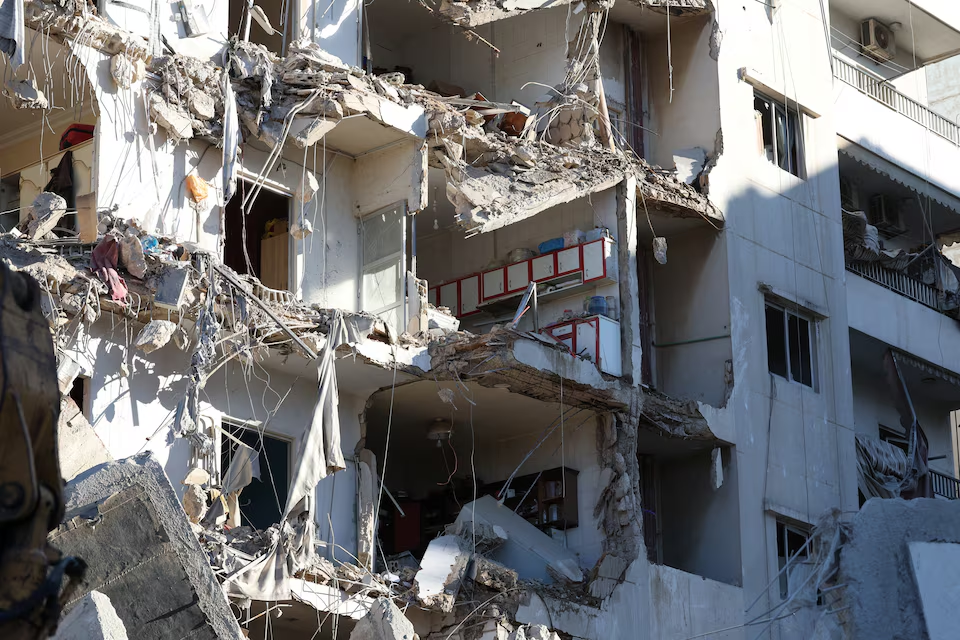
Summary
U.S. rushes anti-missile system to Israel
U.S. envoy Amos Hochstein will hold talks with Lebanese officials in Beirut on Monday on conditions for a ceasefire between Israel and Iran-backed Hezbollah, two sources told Reuters, as Israel expanded its air campaign on the group’s assets overnight.
While Hochstein is likely to push for calm after a year of fighting during which Israel killed leaders of both Hezbollah in Lebanon and Hamas in Gaza, the U.S. has made it clear it will show unwavering support for Israel despite rising death tolls.
The U.S. military has rushed its advanced anti-missile system to Israel and it is now “in place”, U.S. Defense Secretary Lloyd Austin said during a trip to Kyiv.
Austin declined to say whether the Terminal High Altitude Area Defense system, or THAAD, was operational. But he added: “We have the ability to put it into operation very quickly and we’re on pace with our expectations.”
Israel overnight attacked sites in Beirut, southern Lebanon and the Bekaa valley that it said are used by Hezbollah to finance its operations. Hundreds of families fled homes near the targeted locations ahead of the strikes, with no casualties reported.
Israel has reportedly given the United States a document with its conditions for a diplomatic solution to end the war in Lebanon, Axios reported on Sunday, citing two U.S. officials and two Israeli officials.
Israel has demanded its forces be allowed to engage in “active enforcement” to make sure Hezbollah doesn’t rearm and rebuild its military infrastructure close to the border, Axios reported, citing an Israeli official.
Israel also wants its air force to have freedom of operation in Lebanese airspace, the report added. A U.S. official told Axios it was highly unlikely that Lebanon and the international community would agree to Israel’s conditions.
Hochstein is set to meet Lebanon’s caretaker prime minister Najib Mikati and speaker of parliament Nabih Berri on Monday.
Berri told the Al-Arabiya broadcaster over the weekend that Hochstein’s visit was “the last chance before the U.S. elections” to reach a truce and said he would reject any amendments to United Nations resolution 1701, which ended the last bloody conflict between Hezbollah and Israel in 2006.
Cross-border fighting between Israel and Hezbollah erupted a year ago when the group began launching rockets in support of Palestinian militant group Hamas in Gaza.
At the start of October, Israel launched a ground assault inside Lebanon in an attempt to stabilise the border region for its citizens who had fled rocket attacks in northern Israel.
It has also assassinated senior Hezbollah figures, including its veteran leader Hassan Nasrallah who was killed in an aistrike in Beirut’s southern suburbs.
The U.S. and regional powers have tried for a year to secure a ceasefire in Gaza but the efforts have been unsuccessful, leaving Lebanese officials and many diplomats sceptical about the chances for a truce in Lebanon.
FINANCIAL SITE AIR STRIKES
Overnight, Reuters witnesses saw plumes of black smoke billowing in the air after at least 10 blasts in Beirut suburbs. Panicked crowds clogged streets and caused traffic jams in some parts of the city as they tried to get to neighbourhoods thought to be safer, witnesses said.
Eyewitnesses said a building located in the Chiyah neighbourhood in the southern suburbs of Beirut was reduced to rubble and the few people in the area had fled ahead of the explosion, resulting in no casualties.
An Israeli military spokesperson said earlier in a statement posted on social media platform X that it “will begin attacking infrastructure belonging to the Hezbollah Al-Qard Al-Hassan Association – get away from it immediately.”
Al-Qard al-Hassan – which the U.S. has said is used by Iran-backed Hezbollah to manage its finances – has more than 30 branches across Lebanon including 15 in densely populated parts of central Beirut and its suburbs.
There was no immediate statement from the organisation, Hezbollah or the Lebanese government.
Asked by journalists whether the branches could be considered military targets, a senior Israeli intelligence official said: “The purpose of this strike is to target the ability of Hezbollah economic function both during the war but also afterwards to rebuild and to rearm …on the day after.”
Israel has intensified its military campaigns both in Gaza and Lebanon, days after the killing of Hamas leader Yahya Sinwar raised hopes of an opening for ceasefire negotiations to end more than a year of conflict.
With U.S. elections approaching, officials, diplomats and other sources in the region say Israel is seeking through military operations to try to shield its borders and ensure its rivals cannot regroup.
Israel is also preparing to retaliate for an Iranian missile barrage earlier this month, though Washington has pressed it not to strike Iranian energy facilities or nuclear sites.
Hamas-led militants killed 1,200 people and took 250 hostages in the attack on Israel on Oct. 7 last year that sparked the war in Gaza, according to Israeli tallies.
Israel’s military response in Gaza has left more than 42,500 people dead, has made most of Gaza’s 2.3 million people homeless and demolished most of the enclave, Palestinian officials say.
Over the last year, Lebanese officials estimate that more than 2,400 people have been killed and more than 1.2 million people displaced in Lebanon. Fifty-nine people have been killed in northern Israel and the occupied Golan Heights over the same period, say Israeli authorities.